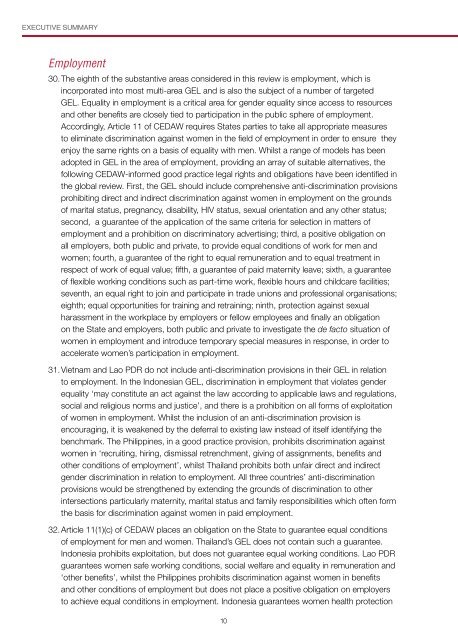Gender Equality Laws - CEDAW Southeast Asia
Gender Equality Laws - CEDAW Southeast Asia
Gender Equality Laws - CEDAW Southeast Asia
You also want an ePaper? Increase the reach of your titles
YUMPU automatically turns print PDFs into web optimized ePapers that Google loves.
EXECUTIVE SUMMARYEmployment30. The eighth of the substantive areas considered in this review is employment, which isincorporated into most multi-area GEL and is also the subject of a number of targetedGEL. <strong>Equality</strong> in employment is a critical area for gender equality since access to resourcesand other benefits are closely tied to participation in the public sphere of employment.Accordingly, Article 11 of <strong>CEDAW</strong> requires States parties to take all appropriate measuresto eliminate discrimination against women in the field of employment in order to ensure theyenjoy the same rights on a basis of equality with men. Whilst a range of models has beenadopted in GEL in the area of employment, providing an array of suitable alternatives, thefollowing <strong>CEDAW</strong>-informed good practice legal rights and obligations have been identified inthe global review. First, the GEL should include comprehensive anti-discrimination provisionsprohibiting direct and indirect discrimination against women in employment on the groundsof marital status, pregnancy, disability, HIV status, sexual orientation and any other status;second, a guarantee of the application of the same criteria for selection in matters ofemployment and a prohibition on discriminatory advertising; third, a positive obligation onall employers, both public and private, to provide equal conditions of work for men andwomen; fourth, a guarantee of the right to equal remuneration and to equal treatment inrespect of work of equal value; fifth, a guarantee of paid maternity leave; sixth, a guaranteeof flexible working conditions such as part-time work, flexible hours and childcare facilities;seventh, an equal right to join and participate in trade unions and professional organisations;eighth; equal opportunities for training and retraining; ninth, protection against sexualharassment in the workplace by employers or fellow employees and finally an obligationon the State and employers, both public and private to investigate the de facto situation ofwomen in employment and introduce temporary special measures in response, in order toaccelerate women’s participation in employment.31. Vietnam and Lao PDR do not include anti-discrimination provisions in their GEL in relationto employment. In the Indonesian GEL, discrimination in employment that violates genderequality ‘may constitute an act against the law according to applicable laws and regulations,social and religious norms and justice’, and there is a prohibition on all forms of exploitationof women in employment. Whilst the inclusion of an anti-discrimination provision isencouraging, it is weakened by the deferral to existing law instead of itself identifying thebenchmark. The Philippines, in a good practice provision, prohibits discrimination againstwomen in ‘recruiting, hiring, dismissal retrenchment, giving of assignments, benefits andother conditions of employment’, whilst Thailand prohibits both unfair direct and indirectgender discrimination in relation to employment. All three countries’ anti-discriminationprovisions would be strengthened by extending the grounds of discrimination to otherintersections particularly maternity, marital status and family responsibilities which often formthe basis for discrimination against women in paid employment.32. Article 11(1)(c) of <strong>CEDAW</strong> places an obligation on the State to guarantee equal conditionsof employment for men and women. Thailand’s GEL does not contain such a guarantee.Indonesia prohibits exploitation, but does not guarantee equal working conditions. Lao PDRguarantees women safe working conditions, social welfare and equality in remuneration and‘other benefits’, whilst the Philippines prohibits discrimination against women in benefitsand other conditions of employment but does not place a positive obligation on employersto achieve equal conditions in employment. Indonesia guarantees women health protection10
















